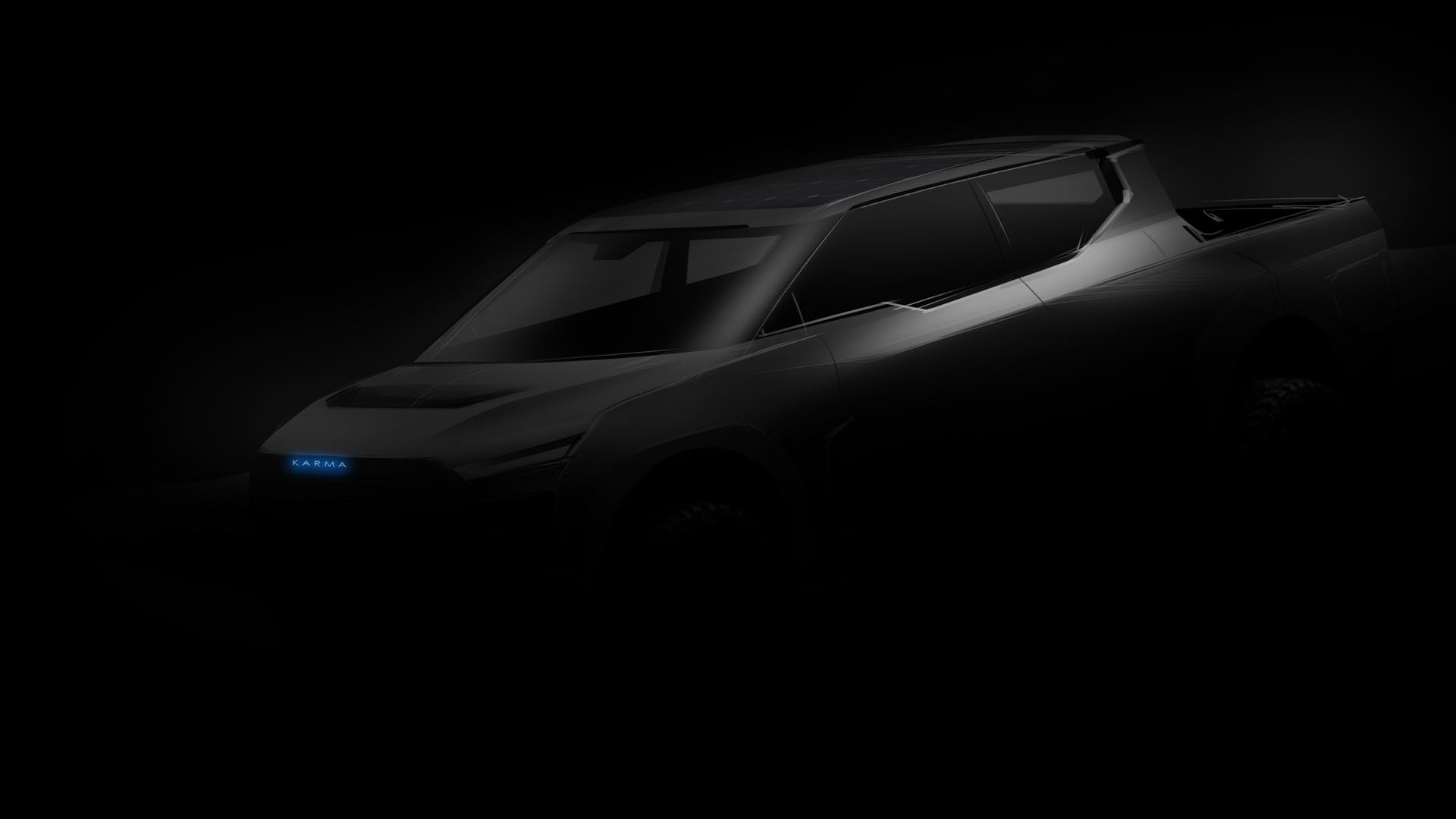

Between Rivian, the electric Ford F-150 and Tesla’s Cybertruck—though we remain skeptical the latter can actually go to production looking exactly the way it does—it has become abundantly clear that pickup trucks are the next big thing for the EV market. At some point, almost every automaker is going to want in. And Karma, the startup birthed from the scraps of Henrik Fisker’s failed brand, is among them.
It’s actually not news that Karma’s doing an EV truck; the automaker originally unveiled its plan via a teaser image just two days before the radical design of the Tesla Cybertruck took the media by storm. (It’s understandable that Karma’s news got buried, as did most other car news that week.) But over the past several days, the automaker appears to have become a bit more advantageous, posting videos on Facebook and meeting with news outlets to begin teasing more details about the upcoming pickup.

The brand’s newest Chief Operations Officer, Kevin Pavlov, told Bloomberg that the unnamed pickup’s underpinning will be a completely new design. The truck will ride atop an all-wheel-drive platform built at the automaker’s factory in Moreno Valley, California. The platform will also reportedly be used for an unannounced high-end SUV. Doubling up on that platform seems similar to what Rivian wants to do with its R1T and R1S.
From the Bloomberg story:
With taxpayer-funded and then failed Fisker as part of its lineage, Karma will face credibility issues until it starts producing and selling vehicles in serious numbers. But Pavlov, who used to lead the e-car unit at auto supplier Magna International Inc., believes the company will be able to stand out in what could soon be a more crowded field of electric models built with the body styles Americans are actually buying, instead of sedans.
“We can bring a utility vehicle into the market and be differentiated,” he said.
Additionally, a video posted by CEO Lance Zhou showed a sneak peek of the pickup prototype, outlining several body lines and key design elements of the vehicle, including a shot of the truck’s gauge cluster and even under the hood. According to Zhou, the truck will deal with range anxiety by coupling a traditionally fueled generator with the vehicle’s battery-powered drivetrain, making the vehicle what Karma calls an EERV – Extended Range EV. Or a hybrid, if you want to get technical.
Karma aims to unveil its progress on the pickup with a concept debut later this year.
Karma’s recent marketing also comes timed almost perfectly with General Motors’ announcement of heavy investment in the electrification of its Hamtramck car and truck factory, a move that enables GM to begin producing its upcoming all-electric pickup en masse. But that also begins to beg the question of the company’s relevancy in a market space that could get crowded fast, and stands to be dominated early on by players with more extensive experience.
Besides the aforementioned Tesla, Ford, Rivian and GM—which will potentially sell the finished product across the Chevrolet, GMC, and possibly even Cadillac brands—several other startups have also found their way into the mix. Bollinger also promises the adventurer-themed B2 electric pickup with a starting price of $125,000, but hasn’t yet announced a date when deliveries will begin.
There are also a few other bespoke firms looking to produce their own electric trucks in the coming months or years. Lordstown Motors, for example, plans to introduce the fleet-oriented Endurance pickup after buying a former GM plant in Ohio. There’s also the long-range Atlis XT and ultra-luxury 1,000-horsepower Hercules Alpha bringing up the rear.
There’s no question about the rapid shift towards electrification, and as Tesla’s Elon Musk has said, that space is ripe for disruption. Trucks make their bones on towing and hauling, and the torque advantages inherent to EVs are easy to see. But Karma still feels like an odd player in that space, especially with the low volume sales seen with the company’s only other production-ready platform, the Revero.
Progress towards electrification is still progress, but I say to you; even if the world needs more EV trucks, can Karma’s actually cut it?